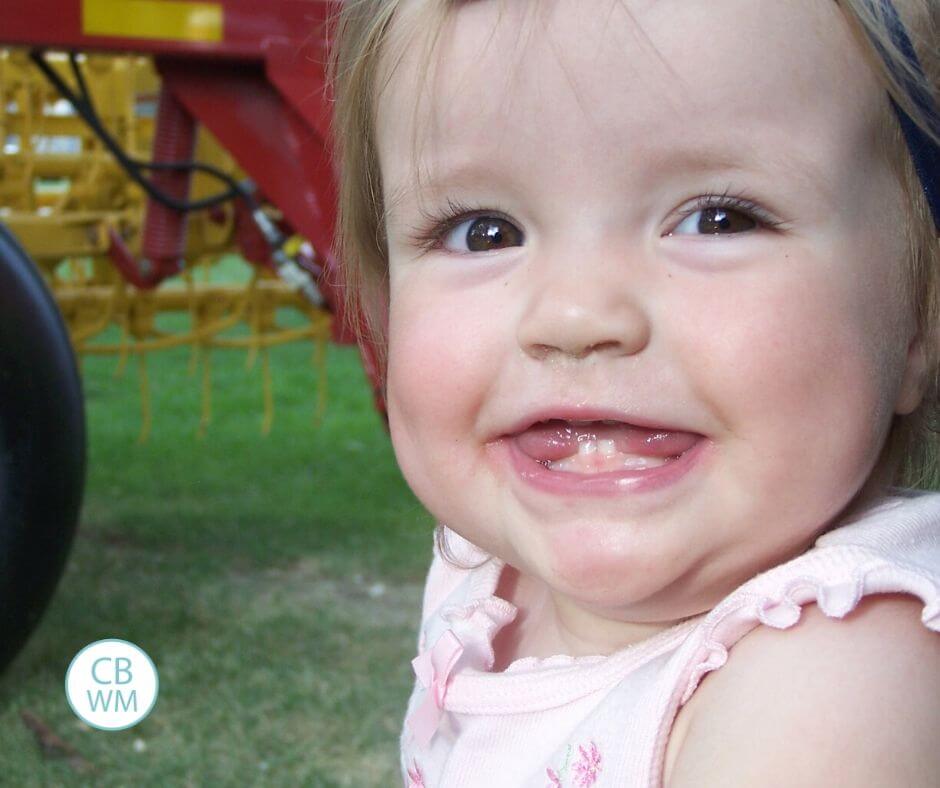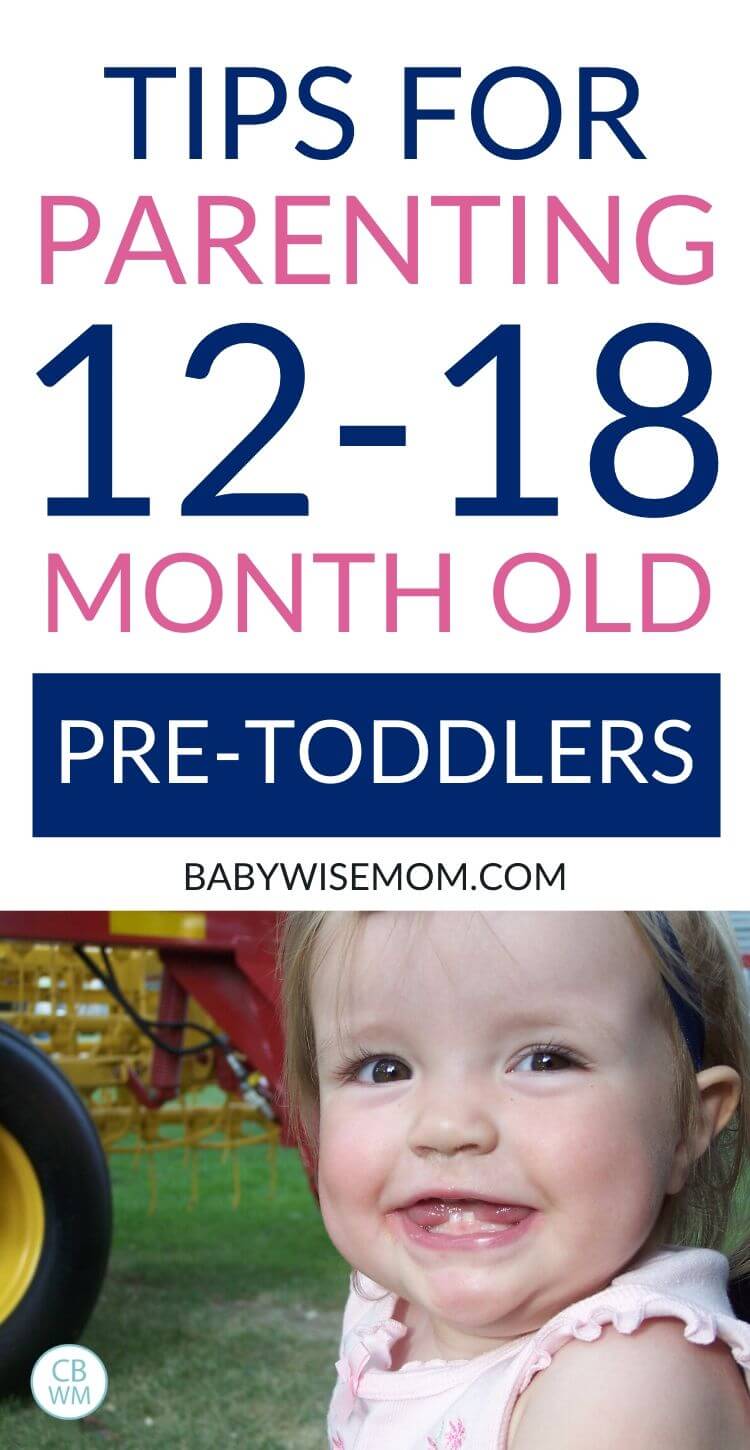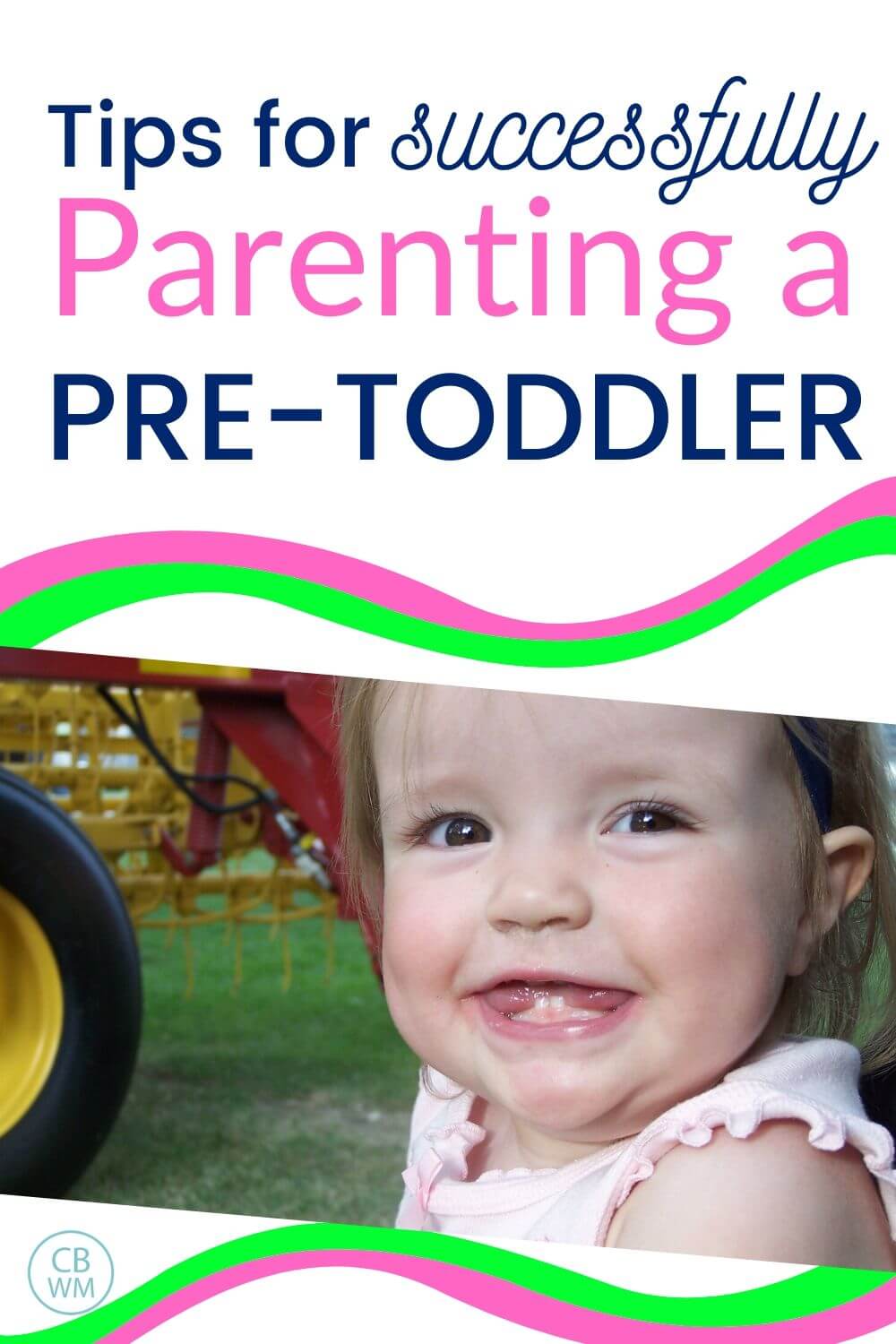Tips for parenting the 12-18 month old range. This age is not quite full toddler yet, but also beyond babyhood. This is called the “pre-toddler” range.

“Confidence comes in part from knowing what to expect at each stage of a child’s development” (On Becoming Pre-Toddlerwise 
The pre-toddler age is a time of transition. Between 12-18 months old, your child is neither a baby nor a toddler. During this transition time, there are some big changes.
Change can be hard, but by the time your child is 12 months old, you should be accustomed to changes. Your baby changed a whole lot from birth to now, right?
But that last few months of the first year get quite comfortable for most families. The baby’s schedule stays the same. Baby’s eating habits stay the same. Sleeping is usually unchanged. You get kind of comfortable.
Post Contents
CHANGES TO EXPECT WITH PRE-TODDLERS
Then 12 months happens and things start to change. Your child starts to suddenly eat significantly less food–so much less you worry she will shrivel away.
She will also most like start to change her needs in napping. Some are ready for one nap a day as early as 14 months, while others aren’t until 22 months or so.
>>>Read: Dropping the Morning Nap (from 2 to 1 naps): Transition Time
Even if she doesn’t go to one nap, she will at least shorten naps, which will send you back to troubleshooting and worrying about naps again.
And discipline? Bring on the tantrums!
And that little baby is suddenly seeming quite grown up. Her comprehension is really showing through and perhaps her communication as well. You start to wonder what it is you should do with a pre-toddler?
Never fear. Even with these changes, you aren’t in new territory.
“…you are not entering a totally new arena of parenting during the next six months but extending the training that you are already familiar with”
(page 24)
Your world still easily revolves around eating, sleeping, and playing.
EATING
What are some changes that take place in the eating arena during the age range of 12-18 months? (pages 24-25)
- Your child will go from mostly purees to mostly eating exactly what the family eats.
- Your child might go from bottle feeding/breastfeeding to drinking milk from a sippy cup.
- Your child will go from being carried to and from the table to coming and going himself.
- Some children will be using a booster seat instead of a high chair by 18 months old.
- At 12 months, he might have dinner on his own, unable to wait for dinner with the family. By 18 months, he will most likely be able to wait.
- My addition, your child will start out being spoon fed by you, but by 18 months he should be able to feed himself with a spoon (not perfectly, but he can do it).
>>>Read: Tips for Feeding Your Pre-Toddler
NAPTIME
The only change in naptime during this period is a possible drop of the morning nap.
Some children are ready to drop the nap as early as 14 months. Others will not drop it as pre-toddlers.
Some children drop it cold turkey. Others drop it some days and still take it others for several months. Still others will slowly shorten the morning nap little by little before dropping it altogether.
If your child drops his morning nap during this age range, it will have a large impact on your waketime each day.
>>>Read: Dropping the Morning Nap Guide
WAKETIME
If your child is no longer taking a morning nap, that means you will have an entire morning to fill rather than just 2-3 hour blocks.
This often will lead to more discipline issues.
“…a pretoddler is too young to reason with but too mobile to be left alone. He needs loving supervision and guidance” .
(page 25)
Let me just say that many children seem to drop this nap right around 18 months old. So most of you will have this dropping happen at an older age, which does seem to make it easier to fill the morning hours.
But let me encourage you that while it can seem a challenge at first, I love it when the child goes down to one nap. It is my favorite time.
Once the child is settled into one nap, he should take one nice, long nap. So instead of the two hour afternoon nap, you will get a 3-4 hour afternoon nap. You also will have this large chunk of time in the morning. You can run errands, go to the park, and visit friends. You can do things more leisurely and take your time.
Don’t force the dropping of the nap. Forcing less sleep leads to sleep problems eventually. Take things at your child’s pace, but going to one nap is something to treasure, not dread.
>>>Read: How To Fill Toddler’s Time When Transitioning to One Nap
NAVIGATING PRE-TODDLER AGE
I remember when Brayden turned 12 months old. He seemed so old to me. I was instantly hit with all of this pressure in my mind to train him up to be a good boy. My mind lept through ten years in ten seconds. I didn’t know what to do or where to start.
I turned to On Becoming Toddlerwise. It gave direction, and though it was written for 12 months and older, much of it was beyond the 12 month old.
They didn’t have Pre-Toddlerwise then. We made it through just fine, but I think it is great that there is a pre-toddlerwise book now to help parents ease into this time period.
With Kaitlyn, this age went along quite smoothly. Again, no pre-toddlerwise to turn to yet. I wasn’t scared that time. I wasn’t worried about the future. It all just flowed nicely.
The difference?
I think it was simply experience. I knew what to expect in the coming months. When she threw her first tantrum, I didn’t wonder where I had messed up. I knew there were plenty more ahead. I had confidence because I knew what to expect.
Milestones like this get easier with more kids. When McKenna was a 14 month old, I hardly even realized I had a pre-toddler. It was all such second nature to me now that it just doesn’t phase me. I don’t say that intending to brag, but to point out how to parent with confidence. As for Brinely, I don’t really remember even thinking about what to do with her at any age–it was all old hat.
So how do you parent your pre-toddler with confidence? By knowing what to expect and how to react appropriately.

CONCLUSION
On a very simple level, you know what to expect during the months of 12-18 months old.
You know your child will eat less food. You know he will start to feed himself more and eat more of what you are eating at each meal.
You know he should start walking. You know to watch for signs he is ready for one nap. And you know you will need to be creative in adding activities to your morning when he does drop that one nap, but that once you are both settled into it, you will most likely find a one nap schedule the easiest you have experienced thus far.
RELATED POSTS
- Dropping the Morning Nap Guide
- Optimal Waketime Lengths for Toddlers 12-24 Months Old
- 10 Truths About Parenting a Toddler
- Overstimulation for Toddlers
- Babywise Sample Schedules: 12-15 Months Old
- What To Do When Your Pre-Toddler is Taking a Short Morning Nap
- Pre-Toddler Summary
- Best Things: 15-18 Months Old
- The Screaming Non-Verbal Baby/Toddler
- Correct Food Portions for Kids from Baby-8 Years
- When Does a Toddler Master Spoon Skills
- Dropping the 4th Feeding
- How To Wean from Breast, Bottle, and Formula
 On Becoming Pretoddlerwise:...Shop on Amazon
On Becoming Pretoddlerwise:...Shop on Amazon

This post originally appeared on this blog June 2010

